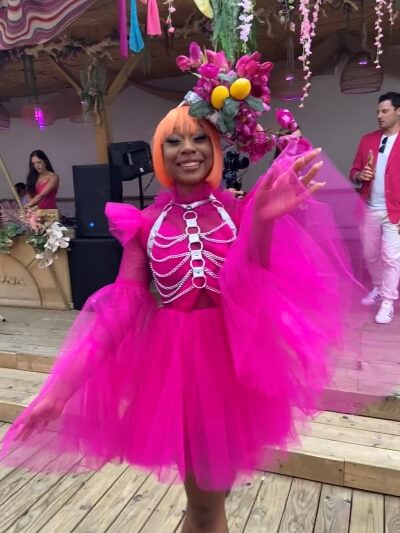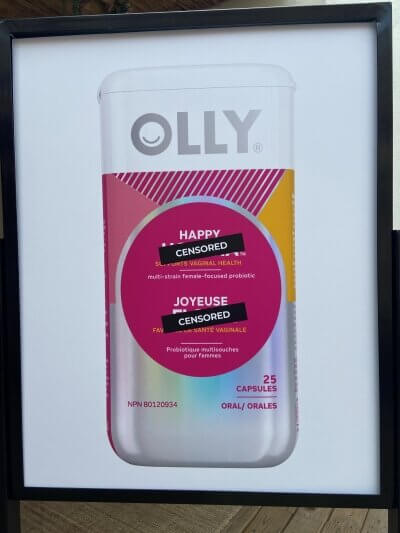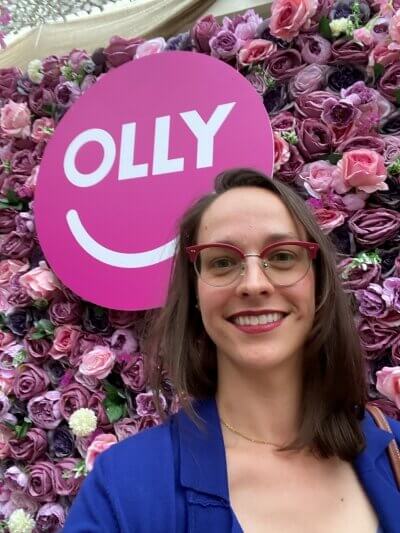OLLY Canada Takes on Advertising Hurdles with Sexual Health Supplements
- August 28, 2023
- Posted by: Jenna Owsianik
- Category: Wellness Industry

The SexTech News blog is supported by its readers and may include affiliate links. Learn more.
Marketing women’s sexual health products, despite their importance, is no easy task.
That frustrating truth was made all the more apparent during the August launch event for OLLY Canada’s Modern Woman line of supplements. OLLY Canada is part of Unilever’s Health & Wellbeing Collective Canada.
At the unveiling held at Soluna in Toronto on August 1, the wellness brand released three new supplements for women: Lovin’ Libido, Beat the Boat, and the surprisingly controversial Happy Hoo-ha.
Lovin’ Libido is meant to support a healthy sex drive and sensation. Beat the Bloat contains enzymes to support digestion. Lastly, Happy Hoo-ha is full of probiotics to maintain a healthy vaginal microbiome and promote favourable gut flora.
The theme and dress code for the event was bold and bright. Likely influenced by the uber-successful Barbie movie, many people in attendance wore hot pink. I wore blue and yellow, a nod to my Ukrainian brethren.
Servers handed out colourful drinks and vulva-shaped waffles in the same orange, pink, and blue tones on the supplements’ packaging.
Beautifully dressed models in hot pink gowns, bright wigs, and chainlink bustiers circled the crowd.
Censoring sexual health
Notably, on display was a poster of a censored advertisement for the pink-labelled Happy Hoo-ha supplements.
While the language sounds tame to me, advertising authorities didn’t agree. Specifically, the word “hoo-ha” was too inappropriate to show to the public.
In fact, both the English word “hoo-ha” and the French word “flore,” meaning flora, were blacked out. (If flore has another meaning in French in reference to vagina or vulva, I’m not sure, but would love to know.)
Leslie Golts, Head of Marketing and General Manager, wouldn’t name the advertising platforms that rejected the ad, but told me the response “was pretty pervasive across the board.”
“We were told we couldn’t put them up, that they were too suggestive or inappropriate,” she said.
The launch of OLLY Canada’s Modern Woman line marked her first foray into the world of women’s sexual health products.
“I was, honestly, as a career marketer, pretty shocked about that,” Golts added, who has 15 years of experience as a Consumer Packaged Goods (CPG) marketer, 11 of those with Unilever.
“I’ve seen some stuff out there that I thought was maybe more inappropriate or similar products for men in the space.”
OLLY Canada gets creative
The rejected ad for women’s sexual health pushed the marketing team to find creative ways to promote the supplements.
For example, they ran public transit ads with the Toronto Transit Commission (TTC) using a play on words instead of outright saying vagina. One ad said “Probiotics for your Spadina,” referencing the busy downtown Toronto street Spadina Avenue.
But the censorship may not have been as widespread as marketing for the OLLY Canada launch event suggested.
Looking at Linkedin images posted by Roisin Collins, Digital Associate Brand Manager at the Health & Wellbeing Collective, not all ads in Toronto or Vancouver that used the word “hoo-ha” were banned.
Certified sexologist and intimacy expert Shan Boodram also spoke at the event.
Boodram is a recognizable face in Canada and abroad. She hosts the popular podcast Lovers & Friends and was featured in Netflix’s reality TV dating show Too Hot To Handle.

Back in the glory days of Much Music, she even appeared on the channel alongside the late Sue Johanson, a beloved Canadian nurse and sex educator known for the Sunday Night Sex Show.
Unlike Golts, Boodram wasn’t surprised by the ad censorship struggles faced by OLLY Canada’s Modern Woman line.
“Women’s sexual health is often the subject of scrutiny and opinion and most of the time from people who aren’t our target audience,” said Boodram.
“Unfortunately, this isn’t news to me. As somebody who has been talking about sex and relationships in the media for the past 15 years.”
“I have experienced every possible layer of discrimination, suppression and people trying to turn me away. But that’s also the good news because it’s 15 years later and your girl is still here.”
My take on pink flowers and hoo-has
I must admit, the word “hoo-ha” as a euphemism for vulva or vagina, especially in the context of sexual health, makes me cringe.
In the larger scheme of sexual health products and services for women and minorities, marketers face unfair and arcane treatment. They’ve got to work within societal norms that often deem the use of both proper anatomical terms and euphemisms for body parts inappropriate for the public sphere.
We often get pink flowers and hoo-has in so-called feminine care aisle marketing in general. But these stand-ins aren’t always safe.
It feels like some obscene insult when such references are censored by advertising platforms.
While phallic objects like bananas for men’s sexual health products are plastered across subways and social media platforms, and commercials that promote erectile dysfunction drugs like Cialis and Viagra show on daytime TV, a happy hoo-ha is too threatening or distasteful to the powers that be.
Regardless, I commend the OLLY Canada team for the successful launch event and their positive work to bring women’s sexual health products out of the shadows.
A note on (in)accessibility


While I was impressed with the event, and the PR team, the venue itself was not wheelchair accessible. It was held at a beautiful location, but there were way too many stairs. No, I’m not lazy, but having to climb steps to enter an event or to use its bathrooms makes it inaccessible to more people than just wheelchair users.
I could handle the stairs, but less than five years ago I faced mobility challenges and struggled to walk long distances and take stairs. So back then I wouldn’t have been able to attend.
Other attendees saw the stairs as an opportunity to film a sexy entry video, I saw it as a barrier between able-bodied and disabled folks.
To be fair, disability awareness consultant Andrew Gurza has called out Toronto’s overall lack of accessible venues many times. The pickings are slim.
Even the so-called wheelchair-accessible venue The Rivoli, located just a few doors down from Soluna, doesn’t have an automatic door opener. Gurza pointed that out to me while leaving the SexTech TO Mixer there in June. It takes away a person’s sense of independence when they need to rely on someone else to get through a doorway.
Here’s to hoping both the marketing landscape for women’s sexual health and the accessibility of Toronto networking events improve in the near future. But I’m not holding my breath on either.




